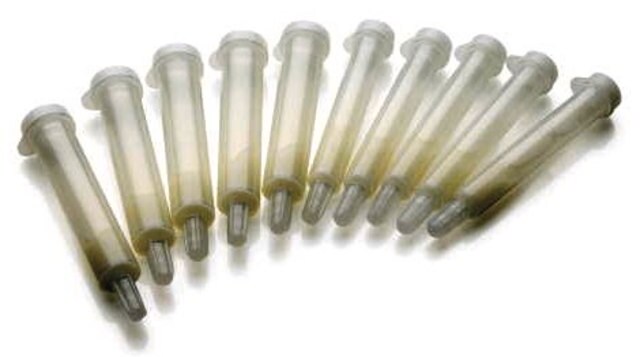GE17-0851-01
Disposable PD 10 Desalting Columns
Cytiva 17-0851-01, pack of 30 pieces
Synonym(s):
Disposable desalting columns, PD-10 columns
About This Item
Recommended Products
feature
wetted part: no
packaging
pack of 30 pieces
manufacturer/tradename
Cytiva 17-0851-01
storage condition
dry media
bed size
14.5 mm × 50 mm
bed volume
8.3 mL
column I.D.
15 mm
matrix
cross-linked dextran
particle size
>50 μm (dry)
85-260 μm
cleaning
2-13
working range
2-13
suitability
suitable for bioprocess medium
Related Categories
General description
The instructions for Disposable PD-10 Desalting Columns have been updated with two new application protocols: gravity or centrifugation, to increase the flexibility of the product. The gravity protocol allows a simple cleanup of samples with one or several columns in parallel, without the need for a purification system. The spin protocol enables runs in parallel in a standard centrifuge with minimal dilution of the eluted sample.
Four adapters are included in each product pack to enable easy centrifugation. Together with LabMate PD-10 Buffer Reservoir, wash and equilibration buffer can be applied in one step with the gravity flow protocol. Empty PD-10 columns are recommended for use with bulk media for affordable and versatile sample preparation.
Features and Benefits
- Fast, affordable, high-recovery desalting and buffer exchange, as well as removal of low-molecular weight compounds packed with Sephadex® G-25 Medium.
- Flexible protocols allow runs by gravity flow or centrifugation.
- Easy to use and equilibrate; apply sample; elute.
- Preparation of the samples in the range of 1.0 to 2.5 mL by gravity flow and 1.75 to 2.5 mL with centrifugation.
- Desalt multiple samples in parallel with a desalting capacity >90%.
- Recovery in the range 70 to >95%.
Storage and Stability
Legal Information
also commonly purchased with this product
Signal Word
Warning
Hazard Statements
Precautionary Statements
Storage Class Code
12 - Non Combustible Liquids
WGK
WGK 3
Flash Point(F)
Not applicable
Flash Point(C)
Not applicable
Choose from one of the most recent versions:
Certificates of Analysis (COA)
Sorry, we don't have COAs for this product available online at this time.
If you need assistance, please contact Customer Support.
Already Own This Product?
Find documentation for the products that you have recently purchased in the Document Library.
Customers Also Viewed
Articles
GST-tagged protein yield varies based on protein, host cell, and culture conditions, influencing production.
GST-tagged protein yield varies based on protein, host cell, and culture conditions, influencing production.
GST-tagged protein yield varies based on protein, host cell, and culture conditions, influencing production.
GST-tagged protein yield varies based on protein, host cell, and culture conditions, influencing production.
Protocols
This page shows how to separate IgG antibodies by affinity chromatography using Protein G GraviTrap from Cytiva.
This page shows how to separate IgG antibodies by affinity chromatography using Protein G GraviTrap from Cytiva.
This page shows how to separate IgG antibodies by affinity chromatography using Protein G GraviTrap from Cytiva.
This page shows how to separate IgG antibodies by affinity chromatography using Protein G GraviTrap from Cytiva.
Our team of scientists has experience in all areas of research including Life Science, Material Science, Chemical Synthesis, Chromatography, Analytical and many others.
Contact Technical Service









